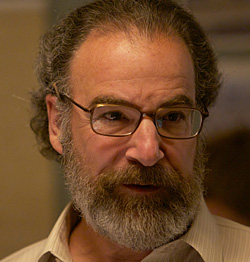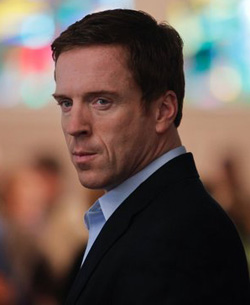 If you tuned into the Emmys last Sunday night, you saw a little program called Homeland emerge as the night’s big winner, snagging six awards including the hat trick of best actor, actress, and drama. The socio-political drama about terrorism is Showtime’s first serious contender to HBO’s long-held throne, and those awards are well deserved. With great acting, tight writing and pacing, and almost unbearable intensity, Homeland is easily the best crafted show on television.
If you tuned into the Emmys last Sunday night, you saw a little program called Homeland emerge as the night’s big winner, snagging six awards including the hat trick of best actor, actress, and drama. The socio-political drama about terrorism is Showtime’s first serious contender to HBO’s long-held throne, and those awards are well deserved. With great acting, tight writing and pacing, and almost unbearable intensity, Homeland is easily the best crafted show on television.
Season 2 begins Sunday night, and it’s got a tough act to follow, as season 1 was alternately a painstaking emotional portrait of wounded souls and a breathless thrill ride. If you hear terrorism drama and think “24”, think again. Homeland mostly eschews ticking clock action sequences in favor of nuanced complex character studies. Carrie Mathison (played with incredible deftness by Claire Danes) is a brilliant but bipolar CIA Agent, who was tipped off in Iraq a few years back that an American POW had been turned. However, the CIA is unaware of any Americans in captivity . . . until Sergeant Nick Brody (the superb Damian Lewis) is released after eight years.
We watch—quite literally, as she sets up surveillance on him—through Carrie’s eyes as Brody tries to adjust to living with his family again in civilization after having been tortured and kept in a hole in the ground for years. Brody is further tormented by the idea that he was coerced into killing his friend and fellow soldier, Tom Walker. On the surface, he’s the perfect American hero, saying all the right things, but as we witness his private moments—awkward and brutal couplings with his estranged wife, uneasy bonding midnight prayer sessions observing the Qu’ran—we question whether Brody is or isn’t a terrorist.

Carrie and Brody, or Danes and Lewis, have instant electric chemistry; the air practically crackles when they finally come face to face. Show runners Alex Gansa and Howard Gordon recognized the potential in having these two leads tangle, and changed the show’s trajectory (originally, Brody was only going to be in season 1, and Carrie would pursue new homeland threats in subsequent seasons). They tumble into the backseat of her car for frantic, desperate sex in a parking lot on their second meeting, and in the breathtaking seventh episode, the season’s midpoint and turning point, Brody discovers his wife had been having an affair with his best friend, and he runs off with Carrie to her family’s cabin in the woods where they have a romantic tryst.
In the woods, real feelings seem to develop between these two wounded souls: she kisses his scars; he admits he wants to just stop time and “live in this moment.” But in the morning, Carrie gives away the fact that she’s been surveilling him for weeks and suspects him of being a terrorist. Brody seemingly comes clean, admitting to being Muslim and having formed a tight bond with one of his captors, the Al Qaeda operative Abu Nazir, who was kind to him, but he angrily asserts that he is not a terrorist. Carrie is torn, and then, too late, she gets a call that the terrorist has been identified by a source as Walker, who actually is not dead.

Carrie meanwhile is becoming more and more desperate to get to the bottom of the case and despite the Walker reveal, she still suspects Brody. Unfortunately, she’s also fallen in love with him. When she reaches out to him again, Brody calls her boss and Carrie is fired from the CIA. Distraught and manic, her bipolar disorder flares into dangerous fixation, but her illness has the byproduct of making Carrie even sharper. She realizes Brody and Walker must be working together, and fears there’s an attack planned at the event Brody is attending, where the Vice President’s announcing his run for President. She races to Brody’s house, startling his teenage daughter Dana when she pleads with the girl that she needs to call her father immediately and tell him to come home. Carrie is arrested, and taken away by the police.
Despite being shaken, Dana’s had her own fears and she calls her father, talking him out of detonating the suicide vest in a positively nailbiting sequence. Crisis averted for the moment, Brody then contacts Abu Nazir and convinces him he can be a greater asset by working inside the system and becoming a confidante of the VP. Nazir sees the potential in this but needs Brody to prove his loyalty: he has him execute Walker. Meanwhile, Carrie, tired and shamed by what a shambles her life has become, opts to have electroshock therapy to manage her illness. In yet another stroke of incredibly bad timing, right before Carrie is shocked, she pieces together a key clue, realizing that Brody knew Nazir’s son. We fade out on season 1 as the electric currents course through Carrie’s body.
As season 2 begins, we’re left with plenty of questions: will Carrie remember and feel vindicated that she was correct? What havoc will Brody be able to wreak in his new political path? Will these two crazy kids find a way to be together? We’ll have to tune in to see, but with a show this devastatingly brilliant and emotionally evocative, it’s sure to be a wild ride.
Tara Gelsomino is a reader, writer, pop culture junkie, and Internet addict. You can tweet her at @taragel.
